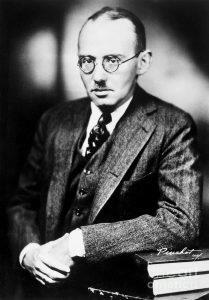Stephen Vincent Benet. Western star – Западная звезда (фрагмент поэмы)

“Western star” – not finished poem, 1943 (Pulitzer Price 1944)
4
…
Из вашей лихорадки и вашего движения вперед,
(О, американцы, безымянные американцы)
Из ваших неугомонных и беспокойных сердец,
Из вашего завоевания, из вашего отчаяния,
Я пишу свою песню.
Я выкликаю все четыре:
Землю, Воду, Огонь и Воздух –
Темную Землю изгнания, Землю, сулящую Индию,
Солнце пустыни, Воду великой реки, и Воздух,
Который уносит раскрашенные листья Осени.
Я выдыхаю дымы церемониальных трубок.
Я говорю, что пути для призраков открыты:
Открыты для вагонов и кибиток,
для сильных отрядов,
Для медленных колес тележек Conestoga,
Скрипящих, как судьба, долгие дни через прерии,
Для волка, и совы, и медведя,
И для охотника, таящегося, как и все они,
Кормящегося за их столом, обгладывающего их мясо,
Крадущего у них, по крохе, знание лесных секретов;
Для всех обутых мокасинами ног,
Шуршавших по руслам потаенных проток,
Для красной и белой ягоды,
Для вождей и предателей,
Для бедного еврея, что последовал за торговлей
И потерял свой груз безделушек
вместе со скальпом;
Для пленников, которых освободят,
И сеятелей диких семян,
И пробивающихся через шторм;
Для женщин, которые рожали,
Распластанные на голой земле,
Кутаясь в старые бобровые шкуры,
чтобы сберечь тепло;
Для сломленных, которые поверили в сказки,
Потерянных пожирателей дурманящего канабиса.
Я призываю печальные леса,
Я называю места, где пролилась кровь, места,
Где в часы, когда нужда была самой острой,
Разбивали лагерь, без надежды на возвращение,
Там, где едва тлели дрова и вода воняла,
И забытые раны начали гореть,
И больные делили последний хлеб…
Я ставлю памятный камень на берегу реки,
Я разбрасываю кукурузную муку на великие земли.
5
О свистуны, могущие нести с собой тот
утраченный ветер,
Американцы, которые насвистывают на ходу!
(А где они – неведомо, и, говоря по правде, наплевать.)
Одолжите мне вашу музыку ненадолго –
Походную музыку десяти тысяч маршей,
Обыденную, как пыль, –
беззаботный забытый ролл,
Отчебученный на банджо и сковороде,
Чтобы проволочь ноги еще одну милю,
Песню, которая возводила свои триумфальные
Арки из реек и штукатурки на полу из грязи,
И ни разу не оглянулась,
чтобы увидеть их падение,
Пока я не разгляжу судьбу, не увижу её всю,
Соединенную с верой в чудо и благоговением,
Как видели её те мятежные моряки –
Морские волки и портовые отбросы,-
Когда итальянский дьявол вёл их,
Пройдя всю известную землю, в бескрайные моря,
В водоворот, в кромешное небытие;
И, после всех страданий и тревог,
Смертельной борьбы и смертельного страха,
Они вываливались на палубу на заре,
Сонные и матерящиеся,
проклинающие питьё и хлеб,
Чтобы увидеть перед собой,… там вдали –
Не кракена и не скалу, притягивающую корабли,
Но, тонкую на расстоянии, тонкую, но твердую сушу,
Линию невообразимых берегов…
______________________________________________
4
...
Out of your fever and your moving on,
(Americans, Americans, Americans,)
Out of your unassuaged and restless hearts,
Out of your conquest, out of your despair,
I make my song. I call
Straitly upon the Four,
Earth, Water, Fire, and Air,
Dark earth of exile, Earth, the Indian-giver,
Sun of the desert, Water of the great river,
And Air, that blows the painted leaves of Fall.
I blow my smoke the ceremonial ways.
I say the ways are open for the ghosts,
Open for rolling wagons and strong teams,
For the slow wheels of Conestoga carts,
Creaking like fate across the prairie days,
For wolf and owl and bear
And the long hunter, secret as them all,
Fed at their tables, nourished with their meat,
And robbing each for scraps of forest-lore,
For all the moccasined feet
That whispered by the solitary streams,
Red bead and white, sachem and renegade
And the poor Jew who followed for the trade
And lost his pack of trinkets with his hair,
The bound who would be freed,
The sowers of wild seed,
The runners through the storm,
The women who gave birth
Stretched on the naked earth
With an old beaver-pelt to keep them warm,
The broken, who were broken for the tales,
The lost, the eaters of the locoweed.
I call upon the sorrow of the forest,
I name the places where the blood was shed,
And, for the hours when the need was sorest,
The brokenhearted camps of no return
Where the wood smoldered
and the water stank
And the forgotten wounds began to burn
As the sick men divided the last bread,
I set the token by the riverbank,
I scatter the cornmeal for the great dead.
5
O whistlers who could carry that lost air,
Americans, who whistle as you go!
(And, where it is you do not really know,
You do not really care.)
Lend me your music for a little while,
The vagrant music of ten thousand marches,
Common as dust, the gay, forsaken lilt
Twanged on a banjo and a frying pan
That bore the footsore on for one more mile,
The song that built its own triumphal arches
Of lath and plaster on a floor of silt
And never looked behind to see them fall,
Till I can see the fate, and see it all,
With something of the wonder and the awe
Those mutinous sailors saw,
Dogs of the sea and sweepings of the dock,
When the Italian devil drove them on
Past all known land, into the utter seas,
Into the whirlpool, into nothingness,
And, after all the travail and the stress,
The mortal struggle and the mortal fear,
They tumbled up at dawn,
Sleepy and cursing,
damning drink and bread,
To see before them there,
Neither the kraken nor the loadstone rock,
But, thin with distance, thin but dead ahead,
The line of unimaginable coasts.
...





